Share
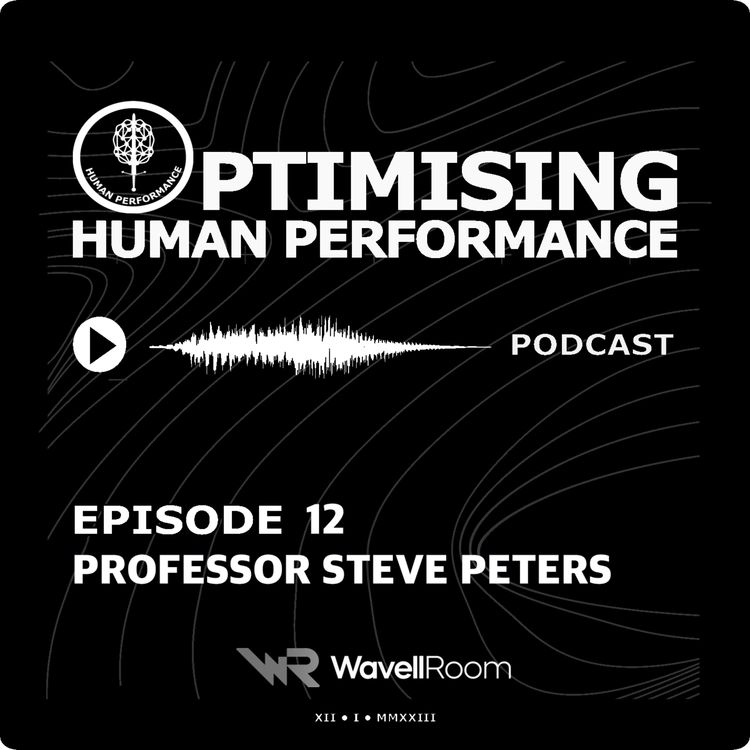
Optimising Human Performance
Professor Steve Peters; The Chimp Paradox, Imposter Syndrome and Antecedents of Human Performance
EPISODE 12: The Chimp Paradox with Professor Steve Peters
In this episode, Martin and Jonpaul talk to renowned psychiatrist Professor Steve Peters, who specialises in the functioning of the human mind. They discuss his famous ‘Chimp Model’ and its application in high-stress environments. They explore imposter syndrome and the antecedents of high performance.
Guest, Cast & Crew
Professor Steve Peters is a medical doctor specialising in mental health and the functioning of the human mind. His work spans education, the national health service, the corporate world, and elite sports. He helps people understand how the mind works, gain insight into their own unique mind and situation, and develop the skills to optimise individual performance and quality of life.
Hosted by Martin Jones & Jonpaul Nevin https://www.ophp.co.uk
Edited by Bess Manley
Produced by Wavell Room https://wavellroom.com/
Resources
- Steve’s company: https://chimpmanagement.com
- Steve’s official website https://profstevepeters.com
- Steve’s Books, including The Chimp Paradox https://chimpmanagement.com/books-by-professor-steve-peters/
If you’re enjoying this content, please like and subscribe so we can keep improving. Remember to visit Wavell Room for their latest articles, podcasts, and newsletters.
Chapters
01:47 Steve Peters' Background and Career Journey
05:03 The Chimp Model Explained
09:29 Imposter Syndrome and Its Implications
17:46 The Neuroscience Behind the Chimp Model
23:28 Values and Team Cohesion in High-Performance Environments
30:32 The Reality of Elite Sports Life
31:45 Psychopaths in Boxing: A Unique Perspective
33:16 Adapting and Learning in High-Stress Jobs
34:42 The Importance of Individualized Training
38:56 Preparing for the Unexpected
40:36 Dealing with Trauma in Psychiatry
46:37 Addressing Moral Injury in Extreme Jobs
51:40 Looking to the Future: Legacy and Personal Projects
55:59 Steve Sets An Emotional Health Challenge
Up Next
This is the final episode of this first series, but all 12 episodes will remain available for you to listen to. We hope to be bringing you a second series very soon. Thanks for listening.
Thanks for listening to Optimising Human Performance.
This podcast is for people who can’t afford to fail. Each episode gives you practical, evidence‑based tools you can apply in the real world.
For more about the podcast, speaking, coaching, and mentoring, visit:
Connect with us:
LinkedIn: https://www.linkedin.com/company/ophp/
Instagram: @ophumanperformance
If you found this episode useful, please share it with one colleague, subscribe, and leave a review – it helps us reach more people who operate in high‑stakes environments.
More episodes
View all episodes

36. The Future of Female Soldiers: Training, Nutrition, and Menstrual Health in Military Optimisation
44:36||Season 3, Ep. 36In this episode, Dr Julie Greeves, principal physiologist for the British Army and expert in applied human physiology, shares groundbreaking research on female soldier health, injury prevention, and performance optimisation. Dr. Greeves unpacks the Women in Ground Close Combat research program, and explains what it tells us about physical performance, load carriage and reproductive health. Listeners from defence, sports, or health sciences will benefit from these insights, which can help tailor training and policies for women in demanding environments. We discuss the implementation of physical employment standards, the importance of nutrition, menstrual health and sleep for female soldiers, and the steps required to help women thrive in strenuous roles within the military.Key Takeaways:Development and implementation of gender-specific physical employment standards and their impact on female recruitment.Physiological differences between men and women: skeletal structure, muscle mass, cardiovascular capacity, and susceptibility to injury.Injury risk factors: higher stress fractures and bone injuries in women, especially during initial training phases.Benefits of female physiology: metabolic advantages, increased fat oxidation during prolonged submaximal exercise, and potential to reduce injury risk with appropriate systems.The myth of training around the menstrual cycle and its practical, science-backed inaccuracy.Hormonal fluctuations, menstrual health, contraceptive use, and their impacts on performance and injury risk.The importance of micronutrients like iron and calcium for women in military settings.The role of sleep, stress, and the gut-brain axis in psychological health and performance, with sex differences in cortisol responses.Practical advice for individuals preparing for arduous training: targeted load carriage, resistance, nutrition, and tracking menstrual health.Guest:Julie is the Head of Army Health and Performance Research in the British Army. After obtaining her doctorate in female physiology, Julie has spent over 25 years pioneering original research on musculoskeletal health and human performance in the military. Julie's research has widely informed Army and Defence policies, and she was decorated with an OBE in 2017 for her scientific contribution to the opening of Ground Close Combat roles to women. Julie holds honorary Chair appointments at the School of Medicine UEA and UCL and has published over 140 original papers in peer-reviewed journals.Hosted by Martin Jones & Jonpaul Nevin https://www.ophp.co.uk Produced & edited by Bess ManleyResources:https://www.linkedin.com/in/julie-greeves-obe-facsm-60170a52/?originalSubdomain=ukhttps://scholar.google.com/citations?user=RgILbTUAAAAJ&hl=en Arduous Training Guide for Women – coming soon!Chapters:00:13 Julie's Career Journey and Current Role02:06 Women in Ground Close Combat Research Program04:39 Implementing Research Findings in the Army08:41 Physical Differences and Injury Risks for Women12:02 Benefits of Female Physiology in the Military16:17 Training and the Menstrual Cycle22:58 Analysing Data on Muscle Performance and Bone Health23:12 Informed Decisions on Contraceptives and Training23:57 Tactical Decisions Around Menstrual Cycle24:17 Understanding RED-S in Military Context25:13 Energy Deficiency and Logistical Challenges26:52 Impact of Sleep on Reproductive Health29:16 Psychological Health and Stress Responses33:14 Nutritional Needs and Training Recommendations36:09 Empowering Women Through Menstrual Health Tracking38:33 Future Research and Implementation42:46 Final Thoughts and Closing RemarksWomen can absolutely thrive in demanding military and sporting environments if they get the right training, nutrition, sleep, and monitor their menstrual health. The tools and policies to support you are on the horizon. Thanks for listening!
35. Are You Born to Run on Less Sleep? A Neuroscientist's Guide to Genes, Fatigue, and Practical Strategies for High-Stress Environments: With Dr Allison Brager
41:56||Season 3, Ep. 35In this episode, Martin & JP talk to Dr Allison Brager, an active-duty Army officer and neuroscientist specialising in sleep and fatigue research.Dr. Brager shares her pioneering research on how both acute and chronic sleep deprivation affect physiological, cognitive, and emotional performance, especially in high-stakes environments. She breaks down the genetic factors that make some individuals resilient to sleep loss, debunks common myths about "training" yourself to need less sleep, and reveals the critical role of sleep in energy (ATP) production outside of the brain. Plus, learn about the military's evidence-based strategies for managing inevitable fatigue, including the best way to use strategic caffeine dosing.Key Takeaways:Acute (Forced Wakefulness): After 18 to 24 hours, an individual struggles to recover performance without a sleep opportunity.Chronic (5 hours/night): Three days of chronic restriction lead to a decline in physiological, cognitive, and emotional state approaching clinically significant levels (e.g., a 50% drop in testosterone).Genetic Resiliency: A naturally occurring mutation in the adenosine receptors can make individuals more resilient to sleep deprivation, slowing the rate of decline in performance under forced wakefulness.The Sleep-First Principle: Sleep is the biological foundation for readiness. It is necessary to replenish glycogen and fat reserves (ATP/energy homeostasis) to support high-intensity training and performance the following day.Nap Strategy: A simple 20-minute nap or "chill time" can significantly increase productivity, morale, and unit welfare in operational settings.Strategic Caffeine Dosing: Do not wait until you feel tired to take caffeine; it's already too late.SLANT Acronym: Optimise a suboptimal sleep environment by controlling Surface, Light (use red light, eye masks), Air quality, Noise (use earplugs), and Temperature.Busting the Morning Caffeine Myth: Dr. Brager states that for an individual with an entrained circadian rhythm, morning caffeine has a minimal effect on the body's ability to use light as a time cue. Light is the most potent time cue, and the idea that you must wait hours after waking up to consume coffee is generally considered "nonsense."Guest, Cast & CrewDr Allison Brager is a highly respected neurobiologist and active-duty US Army officer with expertise in neuroscience, sleep, and circadian rhythms. Her work examines substrates and mechanisms of resiliency to extreme environmental stress in Special Forces and other elite populations during intense maritime, aviation, and land-based training and operations in Antarctica, the Central American rainforest, and other austere environments. Her popular science book, titled Meathead: Unravelling the Athletic Brain, links exercise physiology and neuroscience to her experiences as an elite athlete.Hosted by Martin Jones & Jonpaul Nevin https://www.ophp.co.uk Produced & edited by Bess ManleyResourceshttps://www.westpoint.edu/directory/allison-j-bragerhttps://www.instagram.com/docjockzzz/?hl=en linkedin.com/in/allison-brager-80a58210 Meathead: Unraveling the Athletic Brain https://www.amazon.co.uk/Meathead-Unraveling-Athletic-Allison-Brager/dp/149086444X Born To Run https://www.amazon.co.uk/Born-Run-Hidden-Ultra-Runners-Greatest/dp/1861978774 Thanks for tuning in. If you found this podcast valuable, please take a moment to rate, share & review. If you have feedback, guest suggestions or topics that you'd love us to cover, then do email us at info@ophp.co.uk or connect with us on LinkedIn. Chapters01:33 Exploring Sleep Deprivation07:55 Genetic Factors in Sleep Resilience13:43 Impact of Physical Activity on Sleep24:57 Practical Sleep Strategies for High-Stress Environments29:55 Caffeine and Sleep Management37:59 Conclusion and Final Thoughts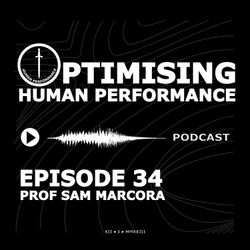
34. The Science of Mental Fatigue: Strategies for High Performance & Endurance with Prof Sam Marcora
44:29||Season 3, Ep. 34Are you ready to unlock your full potential in high-demand situations?Join hosts Martin Jones and Jonpaul Nevin on the Optimising Human Performance podcast as they dive deep into the fascinating truth about mental fatigue with one of the world's most cited sport scientists, Professor Samuele Marcora.Discover groundbreaking and often surprising research findings that redefine the limits of human capability. We don't just explore the problem; Sam provides immediately applicable, practical strategies for mitigating mental fatigue, including:Strategic caffeine use to combat fatigue.The science behind brain endurance training.The critical role of motivation in pushing through mental and physical barriers.Tune in to master your mind and elevate your high performance and endurance to a new level!Guest Spotlight: Professor Samuele MarcoraProfessor Samuele Marcora is a leading authority whose pioneering research seamlessly integrates physiology and psychology to understand human performance. His high-impact scientific publications span crucial topics like physical and mental fatigue, endurance performance, and cognitive load.A sought-after consultant, Sam has advised elite organisations globally, including:Italian Cycling FederationJuventusArsenalBath RugbyHonda Racing CorporationASICSIn This Episode: Key Topics & ChaptersWe break down the science of the mind-muscle connection:Understanding Mental Fatigue (01:42): What is it and how does it differ from physical exhaustion? (02:11)Impact on Performance (05:28): The surprising ways mental fatigue limits your endurance.Cognitive Load and Limits (12:30): Exploring the neurophysiology of mental fatigue. (19:33)Caffeine and Fatigue (23:07): The definitive guide to using caffeine strategically.Nootropics and Energy Drinks (24:00): Evaluating their real role in fighting fatigue.Identifying and Measuring Mental Fatigue (27:51): Practical methods for athletes and high-performers.Strategies to Mitigate Fatigue (31:17): Immediate actions you can take.Training Your Mind for Endurance (33:51): The power of brain endurance training.Resources Mentioned:Sam Marcora's Academic Profile: University of BolognaSam's Publications: Google Scholar CitationsVideo: The Eternal RunHosts: Martin I. Jones & Jonpaul Nevin (ophp.co.uk)Produced & Edited by: Bess Manley00:08 Sam's Professional Journey01:42 Understanding Mental Fatigue02:11 Mental Fatigue vs. Physical Fatigue05:28 Impact of Mental Fatigue on Performance05:39 Research on Mental Fatigue and Endurance12:30 Cognitive Load and Performance19:33 Neurophysiology of Mental Fatigue21:48 Understanding Adenosine and Mental Fatigue23:07 The Role of Caffeine in Combating Fatigue24:00 Evaluating Nootropics and Energy Drinks26:25 Exploring Caffeine Delivery Methods27:51 Identifying and Measuring Mental Fatigue29:53 The Importance of Motivation in Fatigue31:17 Strategies to Mitigate Mental Fatigue33:51 Training for Mental and Physical Endurance40:20 Final Thoughts and Key TakeawaysIf you found this episode valuable, please take a moment to rate, share, and review the podcast. For feedback, guest suggestions, or topics you'd love us to cover, email us at info@ophp.co.uk or connect with us on LinkedIn.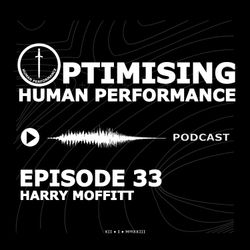
33. From SAS Operator to Psychologist: Harry Moffitt on the Power of Stoicism and the 'Fourth Pillar'
48:50||Season 3, Ep. 33In this episode, we’re talking to Harry Moffitt - SAS veteran, psychologist & human performance consultant. The physical, psychological and social pillars of human performance are well known, but Harry believes that, as a society, we have forgotten the crucial fourth pillar, our philosophical self. We discuss the importance of philosophy as a tool for navigating our uncertain world. We explore how ancient wisdom, developed thousands of years ago, remains deeply relevant today. Guest, Cast & CrewHarry Moffitt retired from the Australian Defence Force after almost 30 years, most of which were spent with Australia’s elite Special Air Service Regiment. He completed 11 active service deployments and completed his time with the SAS as its Human Performance Manager. He’s a registered psychologist and runs a human performance consultancy, Stotan Group, working with sports teams, the military and the corporate world. He has recently released a new book called The Fourth Pillar: Modern Stoicism & the Philosophy of High Performance. Hosted by Martin Jones https://www.ophp.co.uk Produced & edited by Bess ManleyResourcesHarry’s website https://harrymoffitt.com.au/ The new book – The Fourth Pillar https://www.panmacmillan.com.au/9781761563133/ Eleven Bats: A Story of Combat, Cricket & the SAS https://www.elevenbats.com.au/ The Externals' latest album – Back on the Cans https://open.spotify.com/album/1hsoDqmGApnKvLwyxngFB4?highlight=spotify:track:7rL6Sn7C0t9YkBdvVhYWEN LinkedIn: https://www.linkedin.com/in/harrymoffitt/?originalSubdomain=au Instagram: https://www.instagram.com/harrymoffitt353/?hl=en Stotan Group https://stotangroup.com.au/ The Master and His Emissary https://www.amazon.co.uk/Master-His-Emissary-Divided-Western/dp/0300188374 Percy Cerutty https://sahof.org.au/hall-of-fame-member/percy-cerutty/ Thanks for tuning in. If you found this podcast valuable, please take a moment to rate, share and review. If you have feedback, guest suggestions, or topics you'd love us to cover, do email us at info@ophp.co.uk or connect with us on LinkedIn. Chapters00:12 Guest Background & Career Overview01:24 Human Performance Program in the Military03:02 Evolution of Human Performance Programs07:07 Transitioning from Military to Civilian Life11:13 Journey into Psychology15:14 The New Book: The Fourth Pillar20:30 Exploring Stoicism & Philosophy23:56 Discovering Stoicism & Its Modern Relevance25:15 Ancient Practices in Modern Times26:11 The Philosophy of Modern Stoicism27:12 Applying Stoicism in High-Performance Environments30:41 The Role of Philosophy in Personal Development44:35 The Importance of Reading & Lifelong Learning
32. Rebuilding After Catastrophe: The Power of Mindset, Sport, and Humour with Luke Sinnott
44:25||Season 3, Ep. 32Episode OverviewThis special Christmas re-release revisits one of our most powerful conversations: Afghanistan veteran Luke Sinnott shares his extraordinary journey after losing both legs in an IED explosion. Luke opens up about the physical and psychological challenges of his rehabilitation, and the crucial role that sport and humour have played in rebuilding his life and mindset.Guest, Cast & CrewGuest: Luke Sinnott – Former Royal Engineers Search Advisor, Afghanistan (2010). Luke lost both legs in service, went on to represent Great Britain in para sailing and long jump, and is now training to be a commercial pilot.Hosts: Martin Jones & Jonpaul Nevin (ophp.co.uk)Produced & Edited by: Bess ManleyResourcesLuke Sinnott on InstagramLuke Sinnott on XThanks for ListeningIf you found this episode valuable, please rate, share, and review the Optimising Human Performance podcast. Got feedback, guest suggestions, or topics you’d like us to cover? Email us at info@ophp.co.uk or connect with us on LinkedIn.Chapters00:10 – Luke’s Background and Career Journey03:13 – Counter IED Operations in Afghanistan05:55 – Challenges and Responsibilities of Command14:30 – The Incident and Aftermath21:55 – Arrival at DMRC Headley Court22:23 – Life in the Rehabilitation Facility25:02 – Meeting JP and the Role of PTIs26:30 – Understanding Resilience30:20 – The Importance of Humor and Sport in Rehab35:24 – Operation Surf and Its Impact37:25 – Transition to Long Jumping40:27 – Final Thoughts and Future AspirationsOptimising Human Performance delivers evidence-based insights for professionals in high-stress, high-stakes environments. Subscribe for more inspiring stories and actionable strategies.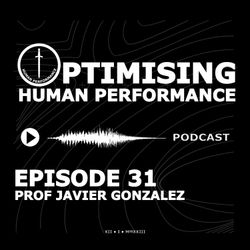
31. Fuel Like a Pro: Inside the Science of Performance Nutrition with Professor Javi Gonzalez
48:04||Season 3, Ep. 31Fuel Like a Pro: Inside the Science of Endurance Nutrition with the former lead performance nutritionist for Team INEOS’s pro cycling. In This EpisodeMartin & JP talk to Professor Javier Gonzalez about food and how we can use it to get the most out of our bodies. They discuss dietary strategies that make a real difference to performance, the science behind popular diets, and the importance of finding the right balance in high-stress, high-performance environments.Guest, Cast & CrewGuest: Professor Javier Gonzalez, Professor of Nutrition and Metabolism, University of Bath, UK. Consultant to sports teams and industry, leading research on how we fuel, burn, and store energy.Hosts: Martin Jones & Jonpaul Nevin (ophp.co.uk)Produced & Edited by: Bess ManleyResourcesCentre for Nutrition, Exercise & Metabolism, University of BathJavier on LinkedInJavier on X (Twitter)Javier on Google ScholarThanks for tuning in. If you found this podcast valuable, please take a moment to rate, share, and review. For feedback, guest suggestions, or topics you'd love us to cover, email info@ophp.co.uk or connect with us on LinkedIn.Chapters02:45 Fueling Strategies for Endurance Events05:23 Low Carb Diets and Exercise Performance07:27 High Carb Diets and Long-Term Health08:22 Personalized Nutrition for Unpredictable Events09:48 Carbohydrate Types and Performance17:12 Professional Cycling Nutrition Insights23:02 Hydration Strategies for Different Conditions24:05 Nutritional Periodization: Balancing Carbs and Fats25:09 Micronutrient Preloading and Supplementation26:31 Supplements for Performance Enhancement28:09 Fasted Training: Benefits and Misconceptions30:45 Dietary Adjustments for Optimal Adaptation37:17 Continuous Glucose Monitoring in Training40:39 Emerging Technologies in Sports Nutrition41:46 Ketogenic Diets and Ketone Supplements44:05 Future Directions in Nutritional Science46:04 Final Thoughts and Contact InformationKey TakeawaysCarbohydrates are critical for high-intensity and unpredictable endurance events.Personalization is key: body size, habitual diet, and environment all matter.Practice your nutrition strategy in training, not just on race day.Supplements like creatine and caffeine have strong evidence; not all trendy products deliver.New advances are making nutrition more personalized than ever before.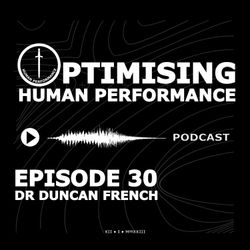
30. Inside the UFC Performance Institute: Strength, Conditioning, and MMA with Dr Duncan French
01:00:41||Season 3, Ep. 30In this episode of Optimising Human Performance, Martin I. Jones and Jonpaul Nevin sit down with Dr Duncan French, Senior Vice President of the UFC Performance Institute, to explore what it really takes to prepare fighters, and other high‑stakes performers, to operate in chaos.Dr French leads the global high‑performance operation for over 700 UFC athletes, with Performance Institute facilities in Las Vegas, Shanghai, and Mexico City. With more than 20 years of experience across 40+ professional and Olympic sports, he has previously served as the Director of Performance Sciences at the University of Notre Dame and as the Technical Lead for Strength & Conditioning at the English Institute of Sport. He is widely recognised for his expertise in strength and conditioning, training transfer, and performance optimisation.Across the conversation, we cover:How strength and conditioning has evolved over the last 20+ years in the UK and USWhat a truly multidisciplinary high‑performance system looks like inside the UFCThe “law of thirds” of athlete buy‑in, and how to work with fighters who “know best”Why MMA is one of the most complex sports to prepare for, and how the UFC PI breaks it downThe cultural challenge of over‑training, red‑lining every session, and chasing “more”How simple human conversations (“How are you today?”) often beat fancy technologyThe role and limits of performance tech, and why some metrics can do more harm than goodWhat other high‑stakes organisations – including the military and police – can learn from MMAGuest, Cast & CrewHosted by Martin I. Jones & Jonpaul Nevin https://www.ophp.co.uk Produced & edited by Bess ManleyResourceshttps://www.ufcpi.com/ https://www.instagram.com/dr_duncan_french/?hl=en https://www.linkedin.com/in/duncan-french-phd-a41bb9122/Thanks for tuning in. If you found this podcast valuable, please take a moment to rate, share and review. If you have feedback, guest suggestions or topics that you'd love us to cover, then do email us at info@ophp.co.uk or connect with us on LinkedIn. Chapters00:52 The Challenges of Combat Sports01:59 Duncan French's Background and Role03:51 Evolution of Strength and Conditioning05:45 Multidisciplinary Approach at UFC Performance Institute09:08 Fighter Mentality and Buy-In13:07 Human Performance Optimization in Military and Sports18:47 Year-Round Training and Readiness24:40 Physiological and Psychological Demands of MMA31:04 The Double-Edged Sword of Training Intensity32:27 Evolution of Fighters: From Brawlers to Technicians33:32 The FMA Model: Fighter, Martial Artist, Athlete35:12 Military Training and MMA: Cross-Disciplinary Insights38:05 The Role of Technology in Performance Monitoring44:00 Humanistic Approach in Sports Science46:52 Challenges in Fighter Training and Recovery49:39 Managing Overreaching and Allostatic Load57:31 Final Thoughts and Wrap-Up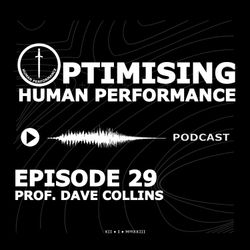
29. The Psychology of Peak Performance: How to Deliver When It Really Counts (with Dave Collins)
41:09||Season 3, Ep. 29Join hosts Martin Jones and Jonpaul Nevin for Series 3, Episode 4 of the Peak Potential podcast by OpHP (Optimal Human Performance). This episode features renowned performance psychologist Dr Dave Collins, who shares expert strategies for maximising human performance through psychological skills. Discover how elite athletes, coaches, and high-stakes professionals can harness the power of the brain, mental imagery, and quality practice to achieve excellence under pressure.Key Topics CoveredPsychological skills for peak performanceThe role of the brain in elite performanceTalent identification and developmentThe impact of quality practiceImagery techniques, including PETTLEP imageryOvercoming trauma and building resilienceAdaptability, continuous learning, and critical reflectionCoaching strategies for high-pressure environmentsAbout Dr Dave CollinsDr Dave Collins is a leading expert in sport and performance psychology. With decades of experience, he has worked with over 70 World or Olympic medalists and professional teams. Dave is a Professorial Fellow at the University of Edinburgh and Director at Grey Matters Performance Ltd. He specialises in developing individuals and teams to perform under pressure and has coached at the national level in three sports.Grey Matters Performance ConsultancyDave Collins on LinkedInDave’s academic researchSport Skill Acquisition BookSport Psychology Essentials (Book)ChaptersDave’s Journey from Military to PsychologyThe Importance of the Brain in PerformancePsychological Characteristics of Developing Excellence (PCDEs)Defining Excellence in High-Stress ContextsQuality Practice and Its ImpactTalent Identification and DevelopmentTransitioning Skills Across DomainsThe Power of Imagery in SportsUnderstanding and Applying PETTLEP ImageryThe Rocky Road HypothesisCoaching Strategies and FlexibilityMaintaining Skills and Continuous ImprovementFinal Thoughts and ReflectionsResources & ContactEmail Dr Dave Collins: dave@greymattersuk.comContact OpHP: info@ophp.co.ukVisit OpHP WebsiteListen & SubscribeDon’t miss expert interviews on optimizing human performance. Subscribe to Peak Potential on your favorite podcast platform and leave a review to help others discover evidence-based strategies for high performance.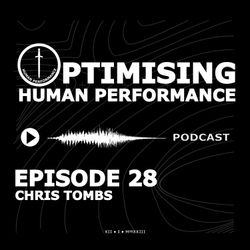
28. Building Resilient Athletes and Lasting Performance with Expert Strength and Conditioning Coach Chris Tombs
51:43||Season 3, Ep. 28How can athletes train smarter for long-term success? Performance coach Chris Tombs joins host Martin Jones to discuss how to build physically and psychologically resilient athletes. With more than 30 years of experience in elite sport and military performance, Chris shares insights on sustainable training, recovery, and human connection in coaching.The conversation covers velocity-based training, reducing orthopaedic stress, and maintaining peak performance without burnout. Chris explains how to create training systems that promote longevity, adaptability, and consistent improvement, helping athletes perform better for longer.This episode is a practical guide for coaches, trainers, and anyone interested in the science of performance, recovery, and resilience.Key Topics:Coaching philosophy and athlete developmentLowering the orthopaedic cost of trainingLongevity and durability in high-impact sportsVelocity-based training and data-informed performanceBuilding trust and human connection in coachingAdvice for new strength and conditioning professionalsGuestChris Tombs has over 30 years of experience in strength and conditioning across professional rugby, action sports, cricket, and the military. His current work focuses on preparing soldiers for the physical and mental demands of their roles.HostMartin Jones — ophp.co.ukProducerBess ManleyConnect with Chris Tombs:LinkedInInstagramIf you found this episode useful, please rate, share, and review the show. To suggest guests or topics, email info@ophp.co.uk or connect on LinkedIn.